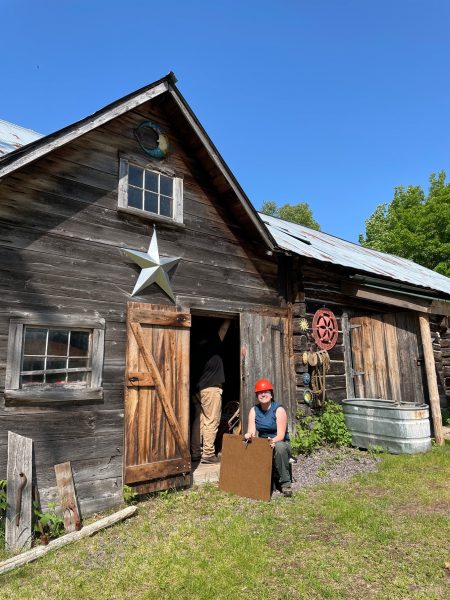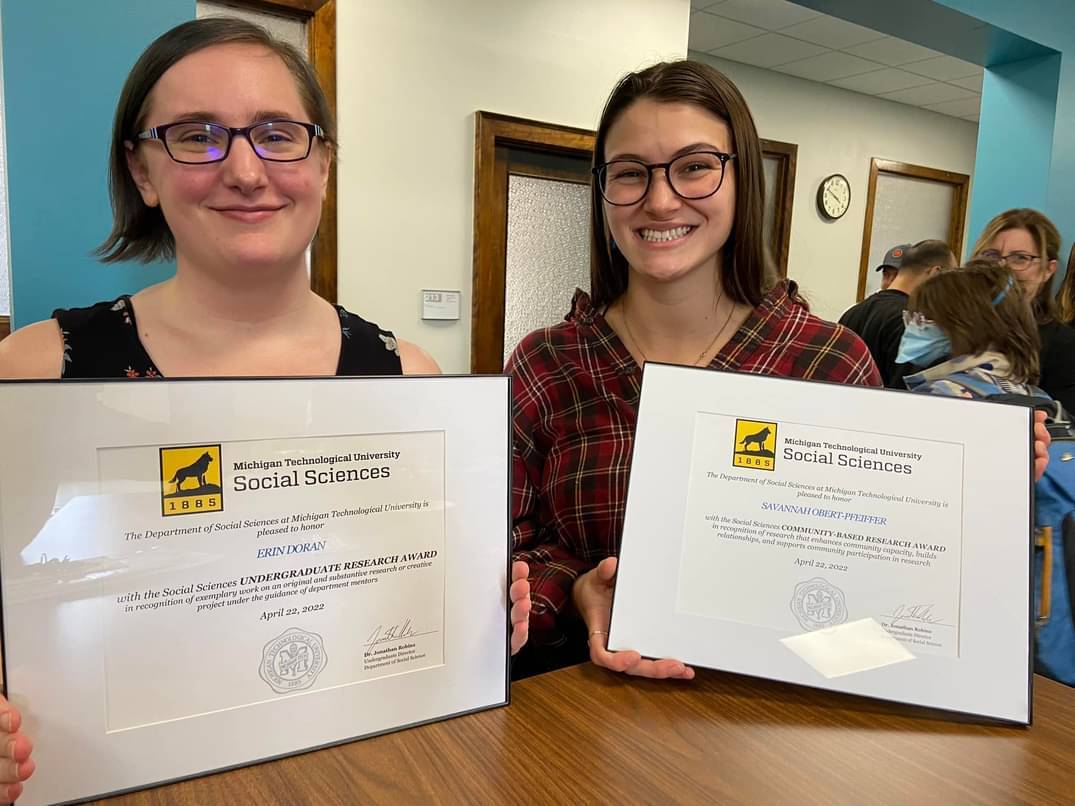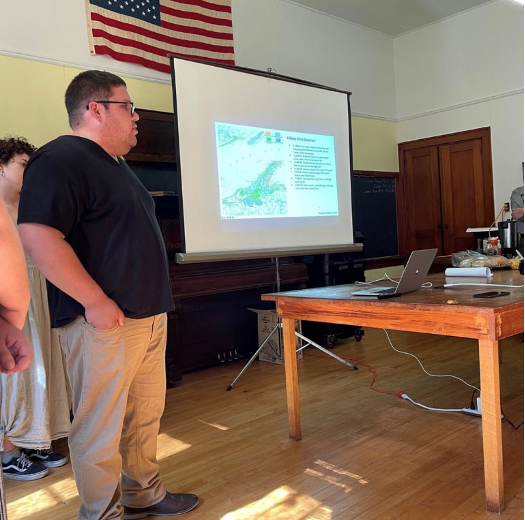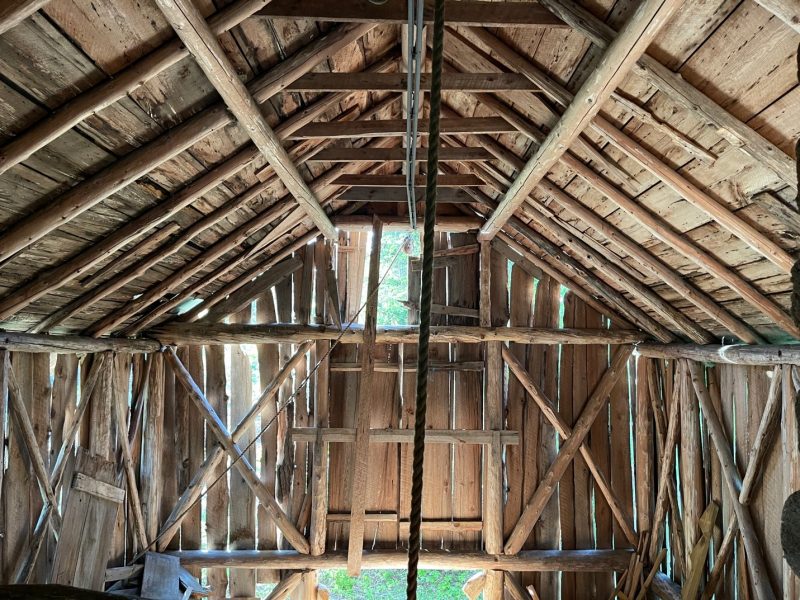Madelina DiLisi’s (Accelerated MS-EEP) write-up about the Western UP Farm to School project–“Farm to School Blossoms in the Western UP”–was published in the Taste the Local Difference magazine newsletter and shares information about the collaboration’s connections to the Fall 2022 Communities & Research class photovoice project.
Hello! My name is Robert Hazen, and I am a Social Sciences major here at Michigan Technological University. This summer I took the four-week course, Documentation of Historic Structures, led by Dr. Sarah Fayen Scarlett (Michigan Technological University), Dr. Hilary-Joy Virtanen (Finlandia University),
and Dr. John Arnold (Keweenaw National Historic Park) where our class was immersed in the history and documentation of the Kemppa Farm in Misery Bay.
While many of us have not done documentation work before, we all brought different skill sets to the table and were able to add new skills to our toolbox. All of us came from different backgrounds, have different experiences, and even have different perspectives—all of which are useful in an immersive class like this, especially when hashing out the historic details concerning genealogy, timelines, and land and building use. Over the course of these past four weeks, I feel like we have all grown together, and we have all worked together quite well.
While it feels like you have just met these students, time moves quickly, and we are at the end of the course. We all forged new friendships and part of me is sad that it is over. I am sad that we all did not have more time together, but I am also sad that we left some questions unanswered. When you give a presentation to a community about their community, you are coming to them with the knowledge that they may or may not know, but there are also questions that will go unanswered. I think the one thing about this work is that I am only 95% satisfied with the finished product and 5% disappointed that I can never answer every question.
For this project, I researched and put together slides for the deep-time overview of the Keweenaw Peninsula with a specific focus on Misery Bay. I used my skills as a researcher to find digitized census records, plat maps, historical aerial images, homestead deeds, genealogical records, and other historical documents. This helped guide us in developing a timeline for the Kemppa Farm but given our time restraints and research limitations—the lack of digitized records or records hidden behind a paywall—we never were able to piece together some pieces of the puzzle.
Regardless of our limitations, our class exceeded everyone’s expectations, including our own. While we can all come away with a list of different skill sets, we all should come away with viewing people, buildings, and landscapes through a different lens than those around us—appreciating the time and efforts of past people in shaping the landscape to create a life of their own.
Finally, as an Indigenous scholar, one of my goals is to highlight the importance of Indigenous land use in the Upper Peninsula, acknowledging that we are on the ceded territories of Ojibwe homelands. It is important to acknowledge and understand the importance of land for Ojibwe Peoples, especially the land around Misery Bay. While we do not know the extent of Ojibwe settlements in Misery Bay, historic maps and newfound evidence provides us with more pieces to the puzzle.
While I come away from this course with a renewed sense of appreciation of the past, it is always important to look to the future and think about historic preservation efforts for sites like the Kemppa Farm. I want to thank Dr. Sarah Fayen Scarlett, Dr. Hilary-Joy Virtanen, and Dr. John Arnold for sharing with us all their knowledge and providing us with new tools to navigate the world around us. This was an unforgettable experience, and I know that this group of students is destined to do great things with their futures. I could not be prouder of the work we all put in. Thank you!
Robert Hazen is a Social Sciences major at Michigan Technological University. He is the 2022 winner of Michigan Tech’s Outstanding Future Alumni Award given to recognize the contribution of a student volunteer who supports the Alumni Engagement mission of “Celebrating Traditions. Creating Connections.” Consideration is given to students who are making a difference, and demonstrate a commitment to the success of an existing Michigan Tech tradition, or create a new one!
A great write-up on Michigan Tech Global Campus News by Shelly Galliah on why engineers need to understand Public Policy – with insights from Dr. Adam Wellstead, Social Sciences faculty member and advisor for MTU’s new Online Graduate Certificate in Public Policy. https://blogs.mtu.edu/globalcampus/2022/10/public-policy-and-engineering/
Summer Field School includes 8 students from Michigan Tech and Northern Michigan; 3 Instructors; 3 generations of property owners; 6 visiting heritage professionals; 5 great days on the banks of Lake Superior; PLUS a dog and a resident turkey (!) all combined for an exciting place-based learning experience!
What does MTU History Associate Professor of History Sarah Fayen Scarlett get when she takes on leadership of the 2024 Vernacular Architecture Forum (VAF) annual conference planning committee? Well, perhaps a few headaches between now and 2024. But also, several unique opportunities to engage in local fieldwork documenting everyday buildings and their cultural meanings for people in the Keweenaw—past, and present. She’s sharing the opportunities this responsibility brings with Upper Peninsula students and professionals. Together they’re working on publishing a conference guidebook featuring local vernacular architecture and conference tour sites. Themes include exploring cultural identity, environmental change, industrial communities, and contemporary heritage practice. Scarlett’s “Barns and Beaches” field school gave upper peninsula college students a great applied learning experience.

Barns and Beaches Field School Uses the Keweenaw Community As A Classroom
The Summer Field School attracted students in a variety of fields such as history, anthropology, folklore, and material culture studies. The June class included two Michigan Tech Social Sciences majors, an incoming Industrial Heritage & Archaeology grad student, four Northern Michigan University anthropology students, and an MTU graduate student as a teaching assistant. The four-week 3-credit course was team-taught by Scarlett, Keweenaw National Historical Park Historical Architect John Arnold (Industrial Heritage PhD 2017), and Finlandia University Finnish Studies Associate Professor and folklorist Hilary Virtanen. The instructors contributed their expertise in documenting everyday buildings and cultural landscapes. They mentored students in the collection of information from people associated with such places.
The group of eleven formed an instantly cohesive team. Their skills and interests were well-matched for the task at hand: to document and create materials describing a Finnish American homestead farm in the Misery Bay area of Toivola and an adjacent summer cottage built in the 1940s. Both properties had remained in the families that established them.
Students Develop Field Work Skills

During the second week, the class met at the Kemppa farm in Misery Bay, Toivola. Students camped in the farm’s front pasture, thanks to the owner and steward of the property’s heritage Luann Hayrynen. This made it convenient for students to document the Kemppa family farm and the neighboring summer cottage, Dell Shack. This intensive fieldwork was augmented by a visit to the Hanka Homestead Farm, a Finnish American homestead farm museum in Baraga County affiliated with the Keweenaw National Historical Park (KNHP) as well as lecture and demonstration visits from area professionals including KNHP staff historian Jo Holt, landscape architect Steve DeLong, Park superintendent Wendy Davis, and MTU’s geospatial scientist Dan Trepal.
Students and instructors precisely measured, photographed, and created field drawings of buildings. They conducted oral history interviews of occupants and their family members to gain insights into the history of the sites’ developments over time and their cultural significance to the families and their neighbors. And they investigated materials offered for examination by the study participants, including family photographs and documents that helped solve building history mysteries. All of this activity generated a vast amount of data. Over the final two weeks, students converted raw data into computer-generated architectural floor plans of each selected building. They deepened their understanding of the properties’ histories with creative research with archival documents, deep geological and cultural historical data, and even aerial and satellite photographs of the Misery Bay area over time.
Read about Robert Hazen’s experience as an undergraduate student in the Summer Field School
Students Present Findings to the Local Community
Students acquired skills in historical architecture documentation and interpretation. They learned to conduct semi-structured oral history interviews. And they wrote interpretive content for use in the 2024 VAF guidebook. The first week centered on intensive readings, lectures, and in-class fieldwork skill-building activities in the Archaeology Lab. One highlight was a virtual visit from Professor Emerita Carol MacLennan on Indigenous land use in the Keweenaw.
During the final week of class, students prepared a group presentation of their findings for local community members at the Misery Bay School. The goals of this culminating event were to spread the word about the upcoming conference and our work at the Kemppa Farm and Dell Shack, but also to have another opportunity to learn more about these properties from people who have their own important perspectives: long-term neighbors. As a result, many stories and memories were shared over refreshments between students, property owners, and neighbors. These relationships will continue to develop as preparation for the VAF conference continues.
For more information about or to participate in the VAF conference in 2024 please contact Dr. Scarlett at sfscarle@mtu.edu.
Check out Dr. Chelsea Schelly’s sustainability blog post about Social Sciences’ new MS degree program in Sustainable Communities.
https://blogs.mtu.edu/sustainability/2022/09/19/new-ms-in-sustainable-communities/
The Department of Social Sciences (SS) would like to recognize the following outstanding undergraduate and graduate students. These awards were recently presented at the departmental end-of-year celebration on April 15th. Honors were extended for excellence in academics, research and teaching.
Graduate Awards
- Outstanding Graduate Student Teaching Award: Shardul Tiwari (Fall 2021) and Jess Applin (spring 2022)
- Graduate School Dean’s Award for Outstanding Scholarship: Talva Jacobson
Undergraduate Awards
- MTU’s Outstanding Future Alumni Award: Robert Hazen
- Social Sciences Departmental Scholar Award: Maya Klanderman
- Social Sciences Outstanding Senior Award: Madelina DiLisi
- Social Sciences Undergraduate Research Award: Erin Doran
- Social Sciences Community-Based Research Award: Savannah Obert-Pfeiffer
- Social Sciences Community-Based Research Award: Maya Klanderman
Well done to all our incredible students!
Erin Doran and Savannah Obert-Pfeiffer
Dr. Steven Walton presented a paper on “Allied Expositionary Forces: War Trophies in America after the Great War” at the Society for Military History conference in Fort Worth, TX on April 29. The work is an extension of the WWI centenary activities developed on campus in 2018 (World War One and the Copper Country) and his work for the edited book, Home Front in the American Heartland: Local Experiences and Legacies of WWI (Cambridge Scholars Publishing, 2020)
Dr. Angie Carter was interviewed and her research featured in the Daily Yonder article “Despite Legal Challenges, Women Still Face Barriers to Inheriting Farmland” by Sarah Melotte. The story will also be featured in the Daily Yonder’s weekly podcast, The Yonder Report, the week of May 2nd, 2022.
Hongmei Lu ’20 (Ph.D., environmental and energy policy) and Shan Zhou (SS) have published a co-authored paper in the Journal of Asian Public Policy.
The paper is titled “Using policy goal ambiguity to manage policy goal conflicts: Sponge-City Program implementation in old neighborhoods.”
The paper uses a case study to understand how local policy implementers take advantages of policy goal ambiguity to maximize the policy outcomes of urban stormwater management program in China, given constrained resources and budget.
A collaborative research team’s work on energy sovereignty has recently been published in the Routledge Handbook of Energy Democracy. Co-authors of “Energy democracy in practice: Centering energy sovereignty in rural communities and Tribal Nations” include Chelsea Schelly, Valoree Gagnon, Andrew Fiss, Elise Matz, Rebecca Ong and Kathy Halvorsen of Michigan Tech, along with Douglas Bessette, Laura Schmitt Olabisi and Kristin Arola of Michigan State University.
Learn more about the work via the Michigan Tech Digital Commons.

